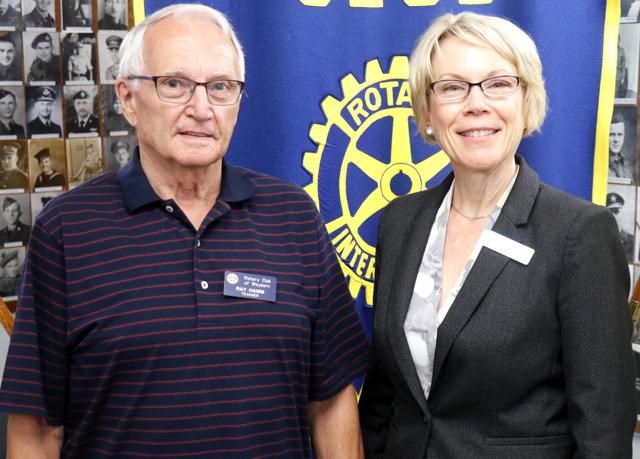There are many charitable groups and organizations supporting cancer patients and research, so when someone wants to donate to one of these causes, they should make sure they know who they are giving to, said the CEO of the Cancer Foundation of Saskatchewan, Nora Yeates.
She was a guest speaker for the Weyburn Rotary Club, introducing the work of the province’s newest cancer foundation, which is the new funding arm for the Saskatchewan Cancer Agency.
This agency operates the Allan Blair Cancer Centre, which is at the Pasqua Hospital in Regina; the Saskatoon Cancer Centre, attached to the Royal University Hospital; patient lodges in Regina and Saskatoon; the community oncology program of Saskatchewan; screening programs for breast, cervical and colorectal cancers; and the Northern Mobile Health Bus.
Yeates noted the two cancer centres are attached to hospitals, but are operated separately from those hospitals, which are run by the Saskatchewan Health Authority.
“As everyone knows, cancer is tough,” said Yeates, noting she lost a very good friend to cancer just in the past week. “Every charity is a good charity, so make sure you know where you’re giving to.”
In Saskatchewan, there are 76 charitable foundations and auxiliaries for 64 hospitals, including the Weyburn and District Hospital Foundation.
Before this year, people had been donating directly to the Saskatchewan Cancer Agency, often in support of the two cancer centres, but this year the Cancer Foundation of Saskatchewan was established to do the fundraising for the agency, and has been operating since January of this year, said Yeates.
She formerly had worked with the Canadian Cancer Society for four years, and so is very familiar with that charity’s work.
Yeates said since the foundation launched in January, the biggest challenge is getting the word out to the public that they exist, and how they are different from other organizations such as cancer groups or hospital foundations.
The Canadian Cancer Society primarily funds cancer research, and also does advocacy work, such as lobbying the government for tougher laws to regulate tobacco use.
There is also the Terry Fox Foundation, which holds the Terry Fox Run each year and the Terry Fox National School Run. They also fund cancer research, and sometimes partner with the Canadian Cancer Society. Thirdly is the Cancer Research Society based in Montreal.
Funds raised by the Cancer Foundation of Saskatchewan stay completely in Saskatchewan, unlike with the three societies listed above, and in addition to the cancer centres and lodges they operate, they fund research that is done in Saskatchewan, with four researchers currently being funded.
Asked how much of every dollar goes to the cancer agency, Yeates said they are striving to make sure 80 to 85 cents of every dollar goes to the agency, which is an important fact that every donor should know about their charity of choice.
There are two major fundraising goals for the Cancer Foundation currently, said Yeates, with the biggest one to buy two new CT scanners for cancer treatment, worth some $3 million.
The second goal is to replace the mammogram bus, which travels around the province to provide breast cancer exams to women. The aim is to replace their 2002 bus, which is old and leaky, and with the required equipment will cost about $1 million.
Explaining the purpose of the CT scanners, Yeates noted that before a patient can go in for radiation treatment, they have to go through a CT simulator which maps out where the tumors are. When the patient then goes under the linear accelerator for radiation treatment, only the cancerous cells are killed, not healthy ones.
Rotary member Diane Horner noted that people need to be aware that half of all cancers are preventable with lifestyle choices and a good diet.
Yeates agreed, and said, “The sad thing is, we’re all invincible until we get cancer. We have to talk about health, lifestyles and diet.”
She acknowledges that it’s going to take time to make people aware of their existence, and they are using social media to get the word out as well as speaking to groups like Rotary and others in the community. She noted she recently was in Prince Albert to do a presentation, and “nobody heard of us.”




